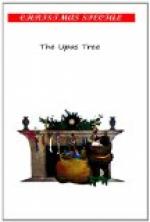Then he looked up, and saw Aubrey Treherne.
He laughed, rather unsteadily. “I thought I was at home,” he said. “For the moment it seemed as if I must be at home. I was experiencing the purest joy I have known since I left Helen. What do you think of my ’cello, man? Isn’t it wonderful?”
“It is very wonderful,” said Aubrey Treherne. “Your Infant is all you hoped. The tone is perfect. But what is still more wonderful is that you—who believe yourself never to have handled a ’cello before—can set the strings vibrating with such unerring skill; such complete mastery. Of course, to me, the mystery is no mystery. The reason of it all is perfectly clear.”
“What is the reason of it all?” inquired Ronnie, eagerly.
“In a former existence, dear boy,” said Aubrey Treherne, slowly, “you were a great master of the ’cello. Probably the Infant of Prague was your favourite instrument. It called to you from its high place in the ’cello room at Zimmermann’s, as it has been calling to you for years; only, at last, it made you hear. It was your own, and you knew it. You would have bought it, had its price been a thousand pounds. You could not have left the place without the Infant in your possession.”
Ronald’s feverish flush deepened. His eyes grew more burningly bright.
“What an extraordinary idea!” he said. “I don’t think Helen would like it, and I am perfectly certain Helen would not believe it.”
“You cannot refuse to believe a truth because it does not happen to appeal to your wife,” said Aubrey. “Grasp it clearly yourself; then educate her up to a proper understanding of the matter. All of us who are worth anything in this world have lived before—not once, nor twice, but many times. We bring the varied experiences of all previous existences, unconsciously to bear upon and to enrich this one. Have you not often heard the expression ‘A born musician’? What do we mean by that? Why, a man born with a knowledge, a sense, an experience, of music, who does not require to go through the mill of learning all the rudiments before music can express itself through him, because the soul of music is in him. He plays by instinct—some folk call it inspiration. Technical, skill he may have to acquire—his fingers are new to it. The understanding of notation he may have to master again—the brain he uses consciously is also of fresh construction. But the sub-conscious self, the Ego of the man, the real eternal soul of him, leaps back with joy to the thing he has done perfectly before. He is a born musician; just as John the Baptist was a born prophet, because, into the little body prepared by Zacharias and Elisabeth, came the great Ego of Elijah reincarnate; to reappear as a full-grown prophet on the banks of the Jordan—the very spot from which he had been caught away, his life-work only half-accomplished, nine centuries before. Even our good Helen, if she knows her Bible, could hardly question this, remembering Whom it was Who said: ’If ye will receive it, this is Elijah which was for to come; and they knew him not, but have done unto him whatsoever they listed.’”




